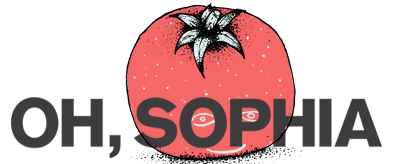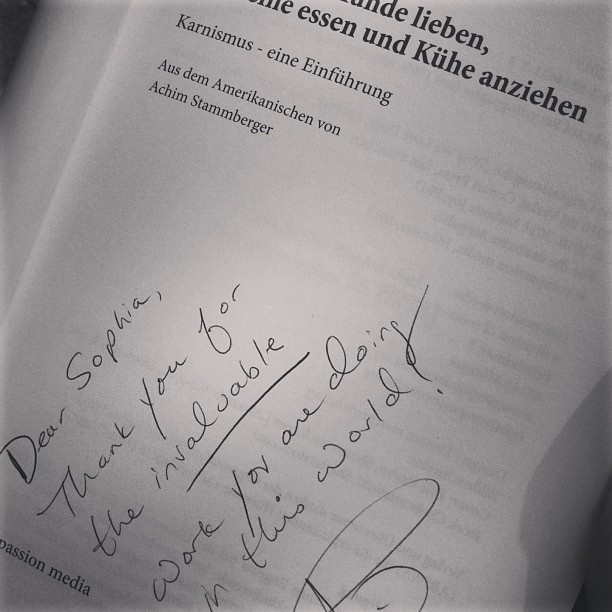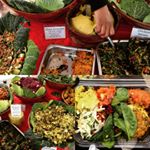Interview w. Melanie Joy about Carnism

Last week it was my pleasure to meet Melanie Joy, an US-american social psychologist, publicist and vegan activist. She is teaching as a professor at the University of Massachusetts. This very inspiring, clever (and attractive) woman, who studied in Harvard, travelled around the world to talk about her theses and did research for 20 years now to find out why we eat pigs and cows, why we would never eat dogs and cats and why this is very much an ethical problem in our modern society…
Her book Why We Love Dogs, Eat Pigs, and Wear Cows has just been released in German (Warum wir Hunde lieben, Schweine essen und Kühe anziehen) and I can only say: “Don’t be afraid to read it, even if you love your sunday steak…!”
Sophia: You invented the word Carnism, what is it?
Melanie Joy: Carnism is the invisible belief system that conditions us to eat certain animals, it’s essetially the opposite of Veganism. „Carn“ means flesh or of the flesh so it refers to meat eggs and dairy, not simply meat. Because it’s a dominant system it’s invisible, so it had not been named, we tend to assume it’s only Vegans and Vegetarians who bring their beliefs to the dinner table, but most people don’t learn to eat pigs but not dogs for example because they don’t have a belief system when it comes to eating animals. When eating animals is not necessary for survival then it’s a choice and choices always stem from beliefs, so in much of the world today people don’t eat animals because they need to, they eat animals because they choose to, but they don’t recognize that they are making a choice or that they even have a choice because the belief system that conditions them is invisible.
S: A lot of people are defending their meat consumption by using the 3 adjectives NORMAL, NATURAL and NECESSARY. Why is it not?
M.J.: The system is constructed to socialise us to belief that eating animals is normal, natural and necessary, but what we call normal is simply the carnistic norm. It means following the path of least resistance. Anybody that steps outside of that is therefore seen as abnormal and that’s really not accurate. Eating animals is not necessary, we know that it’s not necessary for survival, at least for many people in the world today, for some people who are economically disadvantaged or living in geographic locations where they don’t have a choice, then it is necessary, but for many of us it’s not.
And what we call natural is really just the dominant cultures interpretation of history. If we look at history we can see that practices such as murder and rape are arguably as longstanding and therefore as natural as eating animals and yet we don’t look at the longevity of these practices as a justification for them today. These three N’s of justification have been used to justify violent practices from slavery to male dominance and heterosexual supremacy…
S.: You’ve been investigating these subjects for over 20 years now, how long did it take you to invent these terms?
M.J.: I began my research formally for my doctoral dissertation and then I continued my research on a more informal, on a more theoretical level after that. When I had become a Vegetarian and a Vegan, I was curious about my own process, like how I could be a rational caring person and still make such irrational decisions, eating animals is truly illogical if you think about it. I cared about animals and didn’t want them to suffer, I care about justice and would never want to participate in a mass social injustice and yet I directly participated in the system, not even thinking about what I was doing. When I was working on my doctoral dissertation on the psychology of eating meat, after having studied the psycho-sociology of violence and non-violence and prejudice and discrimination, I found that everybody I interviewed, from meat-cutters and butchers, meat-eaters, people who had raised and killed their own animals for food, had the very same attitudes, very contradictory attitudes and they didn’t make sense. Attitutes so contradictory reflect a prejudice and this kind of prejudice doesn’t come out of nowhere. Inconsistent attitudes and behavior are only possible within a context of a widespread ideology and that’s what let me to realize that there was something much more going on than simply individual attitudes and behaviors toward animals.
S.: A lot of intellectual well-educated people are quite aware how these animals are treated, nevertheless do they cultivate meat-eating as a lifestyle, with magazines called “Beef” and items like that, what do you think, how is that possible?
M.J.: Well, there is awareness and then there is AWARENESS. When I talk about witnessing being fundamental for bringing about change, for some people becoming cognitively aware of an issue is enough for them to make changes. But that’s not true for many people. Most people need to be aware on a deeper level, cognitively with our eyes and our minds to see the truth. We also need to be aware emotionally. People can say:”I know what happens to the animals when they are raised and killed” and that’s maybe true but if you allow yourself to know on a deeper emotional level and to connect with the truth of that other’s experience, individuals who are brutally treated and killed, even animals who are raised for organic meat – they go to the same slaughter houses. There’s an inherent cruelty in this. My colleague James McWilliams points out that when you’re taking a life when they are enjoying that life, when they have an investment in staying alive is more cruel than putting someone out of their misery. You can be intellectually aware of something but until you don’t allow yourself to be aware emotionally, you are not fully experiencing the truth of the situation.
S.: Before I read your book, I never thought about how much the meat industry actively hides information from the consumers, a lot of us maybe saw self made videos from animal rights organizations, but there is no official material, no journalistic investigation, which is crazy because in general we life in a society where it has become very common and contemporary to talk about the quality of food and how it’s produced. But consumers seem to neglect that as soon as it comes to meat, how come?
M.J.: I think it’s a combination of things, we inherited the system of Carnism, it’s been around for many generations, for a lot longer than we have and because of that it’s really a self-perpetuating system, it’s institutionalized, simply re-created through social institutions. At the same time there are those who have a direct investment in maintaining Carnism, those are the ones who profit directly from the carnistic industry, from our lack of awareness. And the meat industry and the dairy industriy are massive industries, big businesses, in the United States animal agrobusiness is a 125 billion dollar business a year. And so these businesses know what they are doing, just like any business they have people who help them understand how to most effectively market their so-called products and to appeal to individual people who would very likely in my opinion choose not to participate in this system and not support these businesses if they were fully conscious of the truth.
S.: A lot of people around me argue that not only people in poor countries but also members of our society from a lower social class might not have the money to life on a healthy fully-meat-free diet, what do you think about that?
M.J.: I think there are two pieces of this issue, one is that it’s very important to recognize that whenever eating animals is no longer necessary, whenever behavior becomes a choice it takes on an ethical dimension that it didn’t have quite the same way before. And so for those of us who have the luxury of reflection on the ethics of our choices, I think we have a moral responsibility to do so and we have a responsibility also to acknowledge that not everybody has that luxury. That said, it’s important to recognize that the Vegan movement does not need to be the movement of a privileged white middle class, it is a diverse movement and we need to diversify even more by not making the assumption that is sometimes said that people with less money don’t care as much and therefore are less likely to be part of a change. In the United States there’s some good work been done, talking about being vegan when you don’t have a lot of money. To not make assumptions about people’s orientation or ability just because of their socio-economic status. So we should be doing our reach and awareness raising among all groups with the appreciation that not everybody is going to be in the position the make their choices freely at this point in time.
S.: You have reached out to so many people with your books and lections, what’s your goal that you wanna reach in the future?
M.J.: We have a long way to go. My goal is for Carnism to be a mainstream word and a mainstream concept because once it is established in the mainstream it is accepted as an ideology and we will be able to have a conversation about eating animals that actually is objective. At this point in time, as long as people are looking at the issue through the lense of Carnism, there is no way to have an objective talk about this. Carnistic bias pervades everything so we’ve got to break out of this bias as a society. That’s really my goal to raise awareness of that bias, to build my organisation, we just started fund-raising (for the Carnism network) the good news is that the demand for our work exceeds our capacities because Carnism awareness is really growing…
S.: I was at the Next Organic Fair in Berlin yesterday and I witnessed the growing market for vegan products, the interested clients and an exploding trend for this way of nutrition, it’s crazy how much is happening in this field at the moment…
M.J.: It’s incredible, the world is shifting, at least many places in the world, the Vegan movement is growing exponentially and it’s hit a point where it’s really starting to take off and it is inspiring and amazing to witness that. Germany is already in a leading position when it comes to vegan issues, I believe…
S.: I live in Berlin and the capital maybe can not be compared to the whole of Germany, but I find it amazing how the supply in the supermarkets has changed in the last years, not only can you buy tofu and soy milk but also almond milk and oat cream in my neighborhood supermarket around the corner…
M.J.: We are moving toward a tipping point and that’s exciting to be part of…
S.: What’s your favorite food?
M.J.: I am a foodie, I don’t have a favorite food but I love to eat and cooking is one of my greatest passions. I feel like it’s important to eat a healthy vegan diet, I mostly only eat wholefoods, I avoid processed foods but my weakness is comfort food like vegan maccaroni and cheese or any kind of carbohydrate dish…(laughs)
S.: If you would be a fruit what fruit would you be?
M.J.: Mhm…maybe a melon because that’s my name…Melanie, the melon? But my favorite fruit to eat is apple. I could eat apples all day long!
S.: Thank you so my for the interview!


























[...] “Es ist an der Zeit aufzuwachen!” (Literaturschock.de, Rezension) 04.06.2013: “Warum wir Hunde lieben, Schweine essen und Kühe anziehen (Melanie Joy)” (Lazyliterature.de, Rezension) 29.06.2013: “Karnismus vs. Veganismus” (Reformhaus.de, [...]
[…] by heroic scholar and psychologist Dr. Melanie Joy and her must-read book Why We Love Dogs, Eat Pigs, and Wear Cows, carnism is the belief that it’s […]